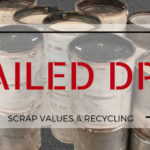Red Fox was proud to contribute to the July 2017 “Reman, Rebuild, Replace” column in Fleet Maintenance Magazine. The article succinctly covers the virtues of DPF/DOC recycling. See the full copy below or link to the article in the July 2017 Fleet Maintenance Magazine.
From July 2017 Issue of Fleet Maintenance
As part of the ratcheted-down emissions regulations finalized in 2001 for on-highway diesel engines, the U.S. EPA set standards – to be implemented in 2007 – requiring that particulate matter (PM) emissions be reduced by 90 percent. To achieve this, engine OEMs developed engines that would operate with higher efficiency and lower emissions.
The engines were equipped with exhaust aftertreatment devices that included diesel particulate filters (DPFs) and a diesel oxidation catalyst (DOC) system, and required the use of ultra low sulfur diesel (ULSD) and low-ash oils.
New Waste Stream
 There are now more 2.2 million DPFs and DOCs on the road needing regular maintenance and somewhat regular replacement. Also, many DPFs are installed on vehicles that have reached the end of their useful life – primarily the retrofits in California.
There are now more 2.2 million DPFs and DOCs on the road needing regular maintenance and somewhat regular replacement. Also, many DPFs are installed on vehicles that have reached the end of their useful life – primarily the retrofits in California.
Failed DPF and DOC cores are beginning to stack up on shop floors across the country, while maintenance managers are actively looking for disposal solutions.
Like many truck and engine components, DPFs and DOCs have residual value greater than that of their scrap metal value. Thus, it makes sense to recycle these systems and not to simply include them in the scrap metal bins that get sent to the crusher.
There are recycling companies, like Red Fox Resources, that that specialize in diesel aftertreatment parts and can provide real dollars back to fleets and shops for failed DPFs and DOCs. Plus, it helps alleviate some of the costs and heartaches associated with the finicky and costly diesel emission systems components.
Three Options
We have identified three solutions that make good business sense when dealing with the developing waste stream of spent DPFs and DOCs:
– Option 1: Throw them in a dumpster and pay to have your garbage hauler take them away.
– Option 2: Throw them in your scrap metals bin and earn $0.25 to $3 per part for the metals in the DPF and DOC cans – assuming your scrap metal buyer will deal with the ceramic substrates.
– Option 3: Recycle the parts and fetch between $20 to $700 per part.
Many fleets are choosing options 1 and 2 as they may not be aware of the recycling option or it may be a choice born out of the path-of-least-resistance mentality. However, fleets that have come to understand the recycling option are finding the process to be pain free and a nice profit center.
What to Look for in a Recycler
When seeking a recycler to deal with, here are some things to keep in mind. An experienced recycler:
– Will be able to guide you through their recycling process and address any potential hazardous waste concerns associated with recycling DPFs and DOCs.
– Should be able to provide testing services to make a determination on any potential hazardous waste concerns associated with recycling your parts.
– Should be able to provide a release of liability and an official transfer of ownership document that would accompany any payment issued for the recycled parts.
It’s important to remember that DPFs and DOCs are serialized parts that have some level of traceability. Therefore, it’s important to make sure your recycler provides documentation that releases your company of any possible liability or regulatory compliance headaches down the road.
Promotes a Sustainable Supply Chain
Without getting into a chemistry lesson, most DPFs and DOCs are coated or “catalyzed” with platinum group metals (PGM) to ensure that diesel engines meet EPA emission mandates. Not all parts are catalyzed with the same amount of PGM, which is why there is a range in the recycled value of the parts.
When DPFs and DOCs are recycled, the PGM is recovered through a specialized process, resulting in PGM being reclaimed and, in most cases, sold back to the manufacturers of new parts.
Manufacturers often talk about developing a sustainable supply chain. A sustainable supply chain makes good business sense since producing products with reusable materials can mean lower costs because of the reduced need for expensive new raw materials.
When fleets and truck shops recycle DPFs and DOCs, they are bolstering the supply of scarce materials, thus keeping the price for the new DPFs and DOCs down.
Good for American Business
More than 90 percent of global platinum is mined outside of North America, primarily in South Africa and Russia. Most people don’t realize where these metals are sourced.
If you recycle your parts through a domestic recycler, the recycled materials from failed DPFs and DOCs are likely refined domestically and ultimately sold to domestic suppliers of parts containing PGM, keeping the material in America and reducing the reliance on foreign sources.
While the dollars associated with recycling spent DPFs and DOCs can be significant, they likely won’t make or break your company’s financial goals. However, the practice can help offset the costs associated with maintenance, while keeping costs for new parts down and promoting a domestic and sustainable supply chain – a real life win, win, win.
Tripp Heller is vice president of sales and marketing for Red Fox Resources (www.redfoxresources.com). The company recycles diesel particulate filters (DPFs) and diesel oxidation catalysts (DOCs) from trucks, buses, heavy equipment and generators at the end of their useful lives through a compliant buy-back program. Tripp has spent his career in the industrial product sales and distribution space, working for Cummins Pacific, Cummins West and Cleaire Advanced Emission Controls. In his time with these companies he has held leadership roles in air quality compliance consulting, strategic marketing, sales management and process improvement.







